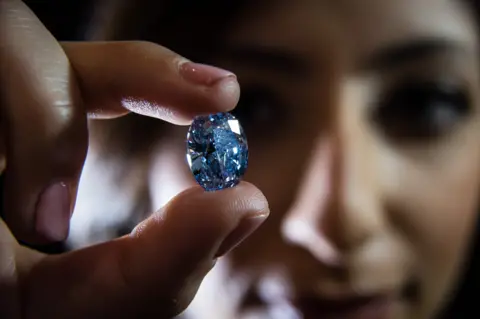UK mining giant to offload De Beers diamond business
 Getty Images
Getty ImagesUK mining giant Anglo American has announced plans to break up the business after rejecting a £34bn bid from rival BHP.
The company said it will sell or demerge major parts of the firm including its De Beers diamond operation and its platinum division.
Anglo American said the "radical changes" will allow it to focus on key areas such as copper, premium iron ore and crop nutrients.
Demand for copper, which is used to conduct electricity, is growing as some countries make the shift to renewable energy and electric vehicles.
A deal with Australian firm BHP would create the world's largest copper producer but could face significant competition hurdles.
Anglo owns two copper mines, in Chile and Peru, where BHP also has some operations.
Anglo has rebuffed two bids by BHP and on Tuesday laid out its own strategy which it hopes will be backed by its shareholders.
These include governments in Botswana, as well as in South Africa, which initially gave a frosty response to BHP's approach. The Australian giant had proposed splitting off Anglo's platinum mining arm, Amplats, as well as its Kumba Iron Ore business.
Anglo, which has had a presence in South Africa for more than a century, said it would go ahead with demerging Amplats - where it is in the process of cutting 3,700 jobs - but would retain Kumba.
It would also keep hold of its crop nutrients businesses though, in the case of its Woodsmith potash mine beneath the North Yorkshire Moors, Anglo will reduce its investment to $200m (£159m) next year and zero in 2026.
"These actions represent the most radical changes to Anglo American in decades," said Anglo chief executive Duncan Wanblad.
BHP had proposed selling off De Beers as part of its bid. Anglo said that it would sell-off or demerge the diamond business, in which the Botswanan government owns a 15% stake.
De Beers was founded in 1888 by British imperialist Cecil Rhodes.
In recent years, campaigners lobbied to have a statue of him at an Oxford University college removed. They said the businessman, who had also been a politician in southern Africa, represented white supremacy and was steeped in colonialism and racism.
In the end, Oriel College said it would not take down the statue because of costs and "complex" planning processes.
De Beers said that "although Rhodes is a part of our early history, he does not represent the company we are today".
Anglo said that its plans aimed to put the business in the best position to benefit from the global shift to clean energy. It also hopes reshaping the firm would lower costs by $1.7bn.
In rejecting an increased takeover offer from BHP, Anglo said the offer was "highly unattractive" for its shareholders as it continued to significantly undervalue the firm.
Mr Wanblad said: "By implementing these portfolio changes ourselves, we will be able to do so in a manner that is respectful of our employees, host communities and countries, including ensuring that in South Africa in particular Anglo American continues to play its role as a responsible business leader to support the country's national priorities."
Anglo American's share price fell by 2.6% to £26.30 on Tuesday.
